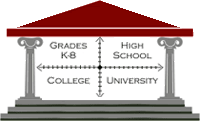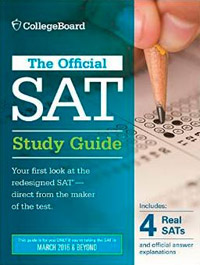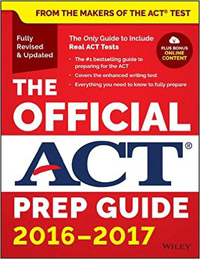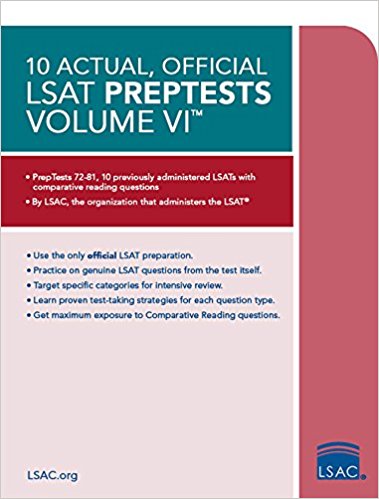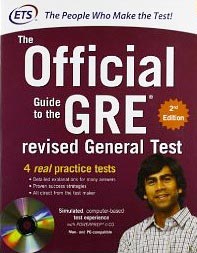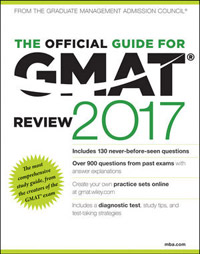|
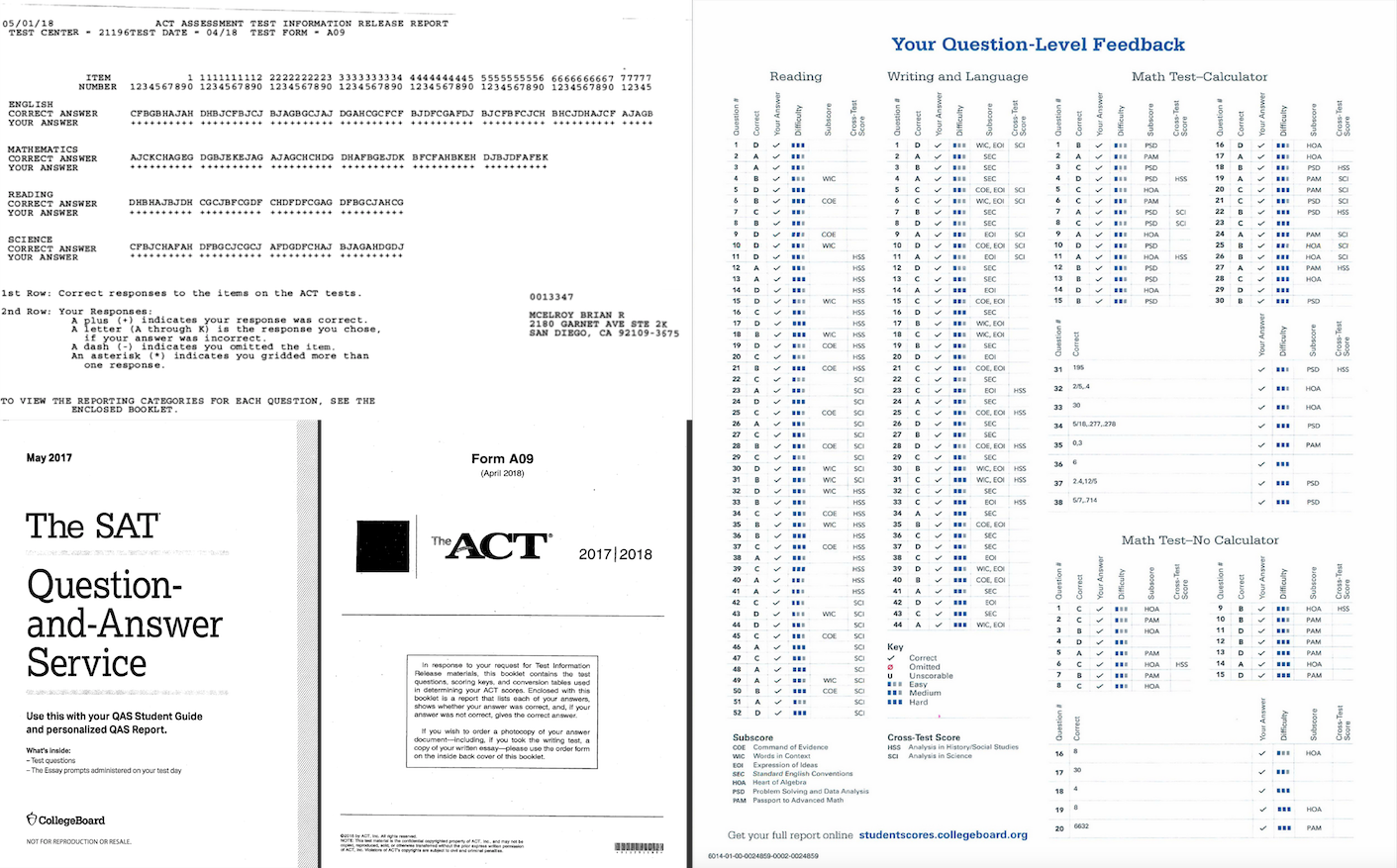
UPDATE, DECEMBER 2023: PLEASE NOTE THAT THE COLLEGE BOARD HAS DISCONTINUED THE QUESTION AND ANSWER SERVICE FOR THE NEW, DIGITAL SAT AKA DSAT.
Original Post, May 2019
The SAT and ACT are two very similar tests that serve the same purpose-- college admissions --and their respective companies (The College Board and ACT, Inc.) offer two very similar services called QAS and TIR, which are basically just fancy terms for “for an extra fee ($16 for the SAT and $32 for the ACT), you can order a copy of your test questions after the exam.”
The College Board offers the QAS on the Saturday test dates in March (US only), May (US & International), and October (US only) of each year. The PSAT 10 and PSAT 8/9, while technically not QAS tests because the service is free, also release several test forms annually.
https://collegereadiness.collegeboard.org/pdf/sat-answer-verification-service-order-form.pdf
ACT, Inc. offers the TIR on the Saturday test dates in April, June and September (formerly December) of every year. Although mostly the same, there are two key differences between QAS and TIR: though the QAS includes a copy of your essay, the TIR requires that you send in an additional form with payment to view your essay. More importantly, the College Board QAS is now online (screenshot below) — it is incorporated into your College Board user account, where you can view the questions immediately after scores are released. For now, the ACT TIR is still the old-fashioned paper booklet version sent in the mail, and it traditionally takes about 4-6 weeks to arrive, though recent tests have arrived much faster.
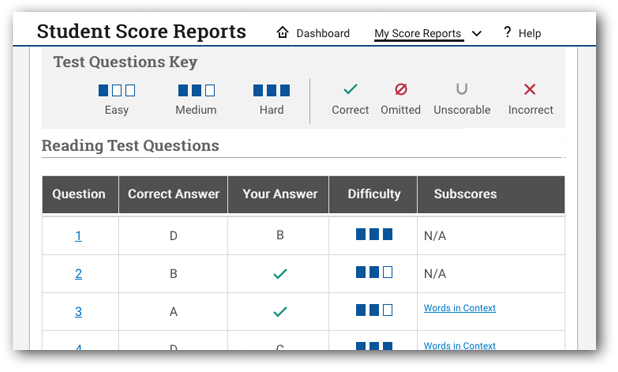
Now, if your first reaction is “wait, shouldn’t I get my questions back for every exam?” then I would be inclined to agree with you—it would only seem fair that a test you pay good money for, one that largely determines your college future, would at least do you the solid of showing you the questions on the test you took — believe it or not, however that’s only the case for 3/7 (43%) of the SAT exam dates each year. For the other 57% of test dates, test takers are left scratching their heads and simply wondering what went wrong — not a good feeling.
So why is it that the College Board and ACT don't want to release the questions from all of their tests? The answer is simple: they plan to re-use those tests. Re-using of tests is a rampant problem in the test industry, given the rise of piracy in the digital age, but sadly, these rich but understaffed test-prep companies continue to re-use tests, which means that we will see certain test forms leaked before the test itself, such as the December 2018 International SAT, which was sent to be by an anonymous whistleblower the night before the exam.
The College Board even adds insult to injury by offering a deceptively similar “SAS” (Student Answer Service) on the other test dates in June, August, November and December — but this service is a cruel joke and a waste of money. Not only does the SAS not show you the actual questions, but it doesn’t even show you the correct letter answers, or the answers you chose—it simply indicates which questions you answered correctly and incorrectly.
Most elite high-school students will take the SAT and ACT more than once, and multiple attempts tend to improve one’s score, even without additional studying, so it is understandable why one would seek to take advantage of the QAS and TIR services. As a general rule, unless the SAT or ACT you are taking is your final test (and thus there is no need to learn from your mistakes), it always makes sense to try to schedule on one of these test dates so that you can actually access the questions themselves, try them again, and extract additional learning from them before your next attempt at the exam.
HOW TO USE THE QAS AND TIR TESTS:
Unless you answered every question correctly (in which case, time to move on to college applications!), or you don't plan to retake in order to improve your score, you will need to review the QAS/TIR to learn from your mistakes.
Pro tip: try to avoid the (strong!) temptation to immediately check the correct answers to the questions you answered wrong the first time. Instead, ignore the correct answers at first. Instead, write down the numbers of those questions and try them again, from scratch, with no time limit. Only after you have tried the questions again should you check the correct answer. You will find that the College Board online QAS interface makes this process quite easy, since it shows you a blank question at first and requires a click to show your answer (and the correct answer). You can also use the "filter" function to look only at questions you answered incorrectly. Again, try to avoid the temptation to peek at the correct answer without trying the question first!
If you get it right on the 2nd try: congrats! This means that you either made a careless error, or a type of mistake that you have since improved upon. However, it's still worth considering your original answer, and why you may have chosen it.
If you get it wrong on the 2nd try: don't despair. If you get the question wrong on the 2nd try, then this probably indicates a true weakness that needs to be addressed. Give these questions highest priority in your studies.
Please note that while the PSAT QAS does indeed include official answer explanations from the College Board, which you may or may not find sufficient, the SAT QAS and the ACT TIR do not include any answer explanations, so it is up to you to consult the provided answer key, and figure it out from there.
-Brian
Sources:
https://collegereadiness.collegeboard.org/sat/scores/verifying-scores
http://www.act.org/content/act/en/products-and-services/the-act/scores/request-a-copy-of-qa.html
https://web.archive.org/web/20210120230445/https://www.act.org/content/dam/act/unsecured/documents/TestInformation_Release_orderform.pdf
Back to Blog Home
|



